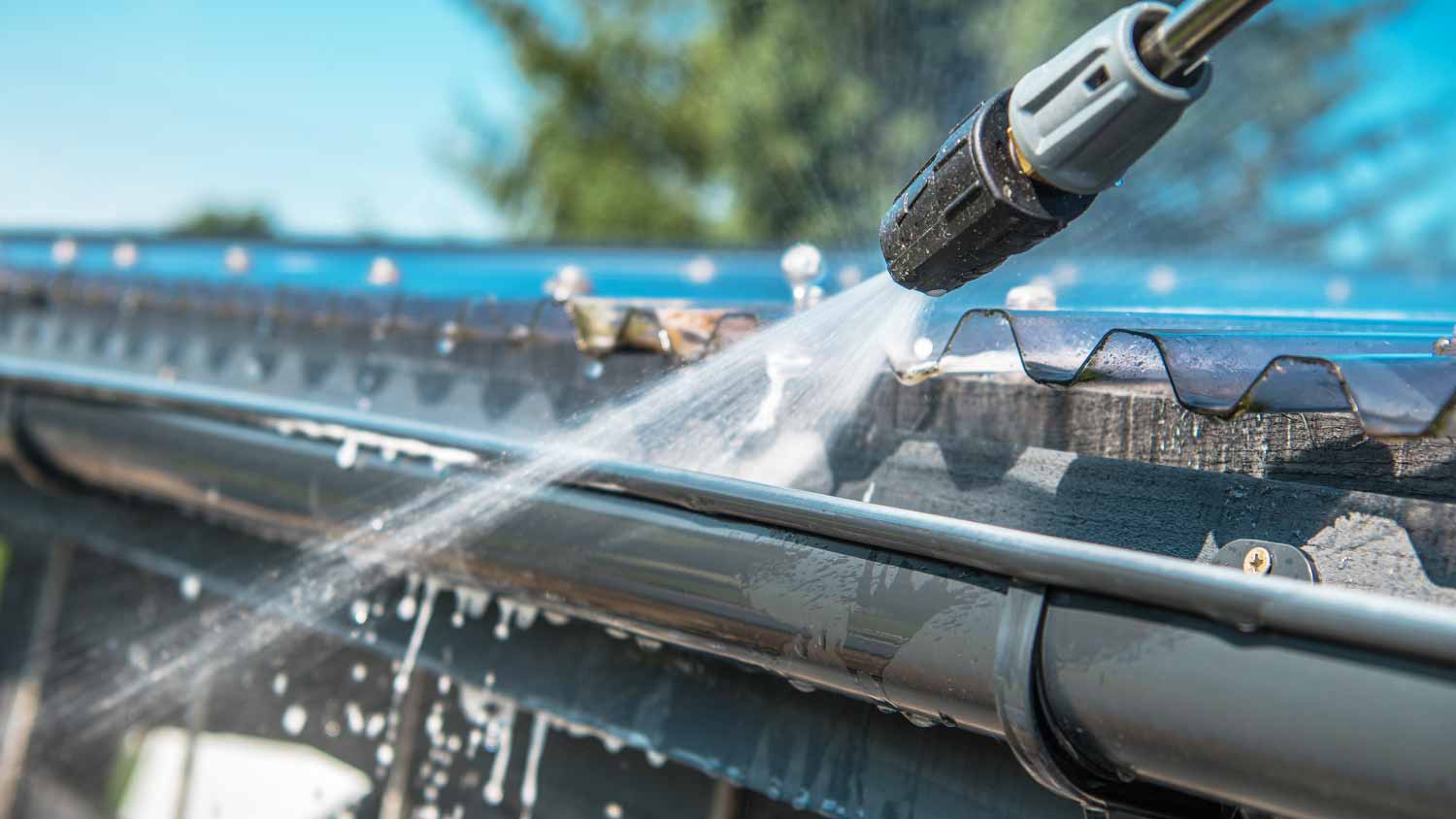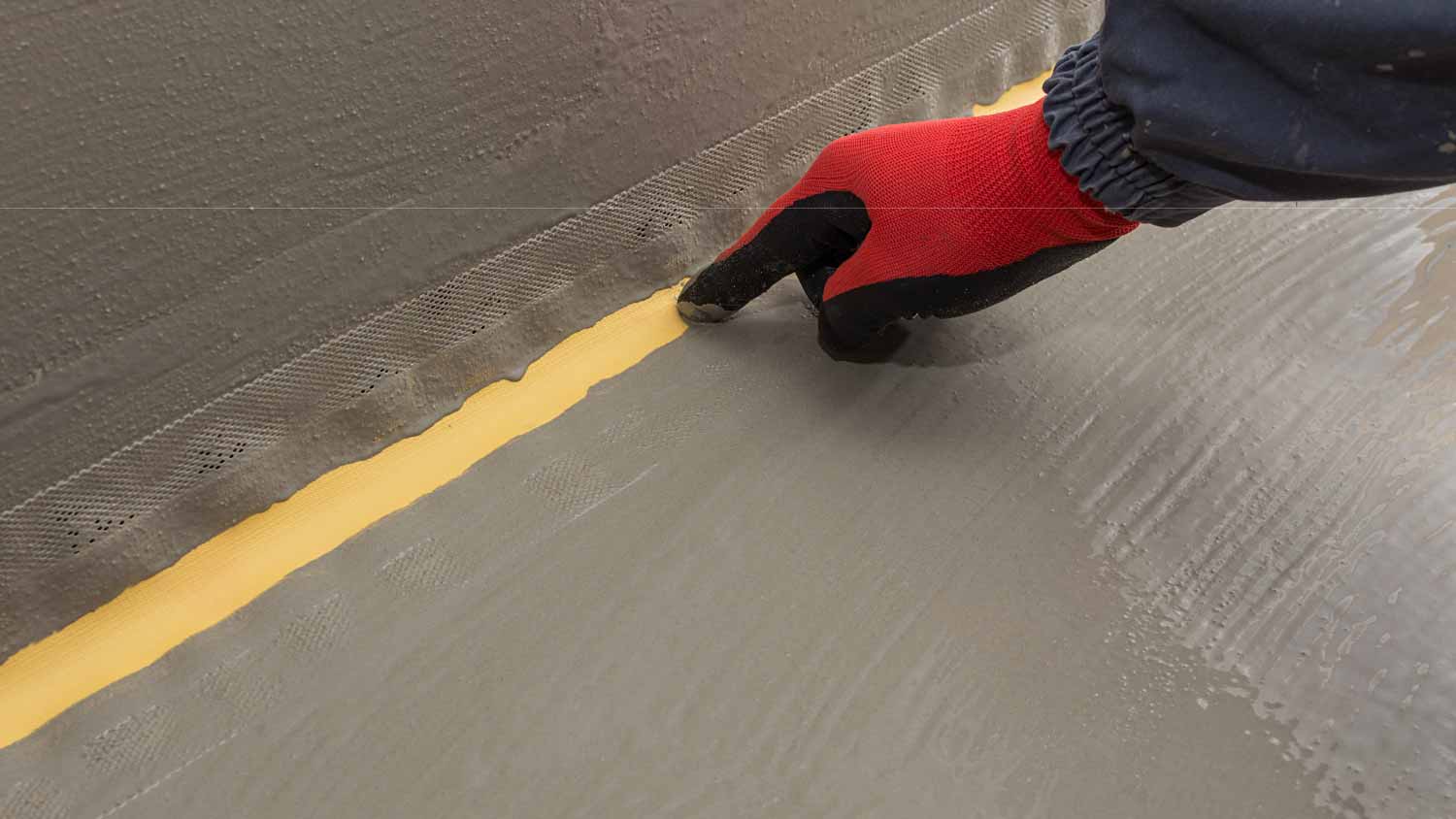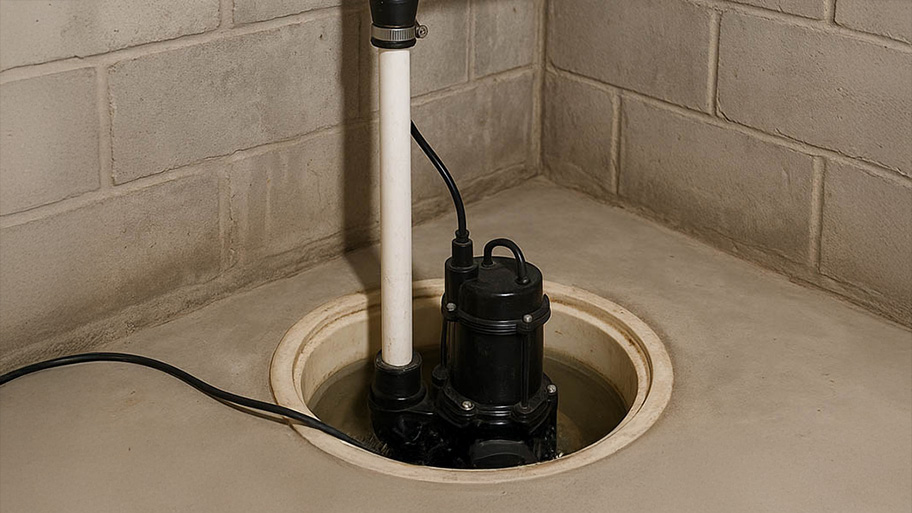
Sump pump battery backup costs depend on the type and the design of the system purchased. Follow this guide to learn how to budget for your backup battery.
Get rid of water leaks in your basement, once and for all


If you see water seeping through the basement floor, deal with the issue immediately.
DIY basement waterproofing costs around $600–$1,000.
Water typically enters your basement because of hydrostatic pressure.
Have you ever gone down the stairs to your basement and discovered that you have water seeping through your basement floor? There could be several causes, but knowing the cause and how to stop water from coming up through the basement floor is essential to finding a solution as quickly as possible.
Unlike some projects that can wait on the back burner, you should deal with this as soon as possible to avoid even bigger problems down the road. Keep reading to learn about seven common reasons why water is seeping through your basement floor.
Drain issues can mean a few different things, but it’s one of the most common causes of basement flooding. For example, a sewer drain could be clogged and back up into your basement every time you flush the toilet or use the dishwasher, sink, shower, or washing machine. The clog may be reachable with a drain snake, but it may also be far enough away that it requires tools that only pros tend to have.
Another possibility is that the drain tile around your foundation is cracked, collapsed, or clogged with roots or soil that have filtered in over time. A clogged drain tile prevents water around the base of the foundation from reaching the sump crock to be pumped out.
Although cracks in your foundation don’t necessarily cause water to seep up through the floor, water leaking into the basement through the foundation walls can run down and onto the basement floor. The outside of your foundation walls should be waterproofed with either tar or a plastic membrane or a combination of those.
However, over time the settling and movement of the ground around the foundation walls can cause cracking. The footing and foundation walls themselves can settle and crack, too. Water from rain and melting snow and ice filtering down through the soil can leak in through even the smallest cracks or pinholes in the foundation waterproofing material.
This is an issue for a professional foundation repair specialist. Letting it go or not doing the repairs properly can eventually cause major foundation damage, not to mention water damage in your basement.
Leaking pipes are another possible cause for water on your basement floor. That doesn’t mean the water is seeping up through the floor, but leaky drain pipes or water supply pipes can cause major damage to your basement, especially if it’s finished with drywall or other materials that absorb water. Water and moisture that doesn’t dry out can lead to mold and mildew, which, according to the , can cause health problems for you, your family, and your pets.
Keep in mind that significant condensation can occasionally create the appearance of pipe leakage. Condensation occurs when the water within your pipes is considerably colder than the outside air. When the external air makes contact with the cold pipes, water vapor in the air condenses on the metal surface of your pipes. To address the condensation problem, consider installing insulation on your pipes.
Another way that water can find its way into your basement is when the gutters around your roof are clogged. Water overflows and falls down beside the foundation. This often brings foundation drainage issues to light, especially during a heavy rain or when a lot of snow melts at once. Water gathers around the foundation of the house faster than it can drain into the soil.
This is when water may come in through cracks in the foundation or even run over top of the wall, depending on how high the grade is around the house. Cleaning out your gutters and making sure the downspouts carry water far enough away from the foundation to drain away rather than back toward the house will help prevent water from getting into your basement this way.
The grade around your house can also contribute to water issues in your basement if the slope of the ground doesn’t allow the water to drain away from the house. The soil around the foundation can settle and create a trough or low area along the foundation walls that traps water. Even soil that drains well can only handle so much water. Making sure that the grade of the landscaping allows water to drain away from the house will go a long way toward keeping your basement dry.
A common cause of water on your basement floor is a sump pump-flooded basement because the sump pump stopped working. Whether the motor burns out from normal use, it shorts out from water getting into the motor, or simply from the power going out, the sump pump quitting means the water running into the sump crock from the drainage tile around your foundation has nowhere to go but up into the basement.
According to data from Angi, about 58% of homeowners want to repair their sump pumps within 1 to 2 days, and another 26% want the work done within 2 weeks, highlighting that most of these requests are emergencies or very urgent. Roughly 13% of homeowners were unsure or still in the planning and budgeting process, while only 3% could wait more than 2 weeks.
Unfortunately, heavy rains can often cause dreaded flooding issues in your basement. Large amounts of rainfall in a short period of time can overwhelm your municipal sanitary sewer system, resulting in a backup of sewer water into your home.
This issue is likely the case if the water is seeping in through your basement’s floor or sink drains. If you’re sick of finding water coming up through your basement floor after every thunderstorm, consider hiring a local sump pump professional to take a look and recommend repair and prevention methods.

Generally speaking, water enters your basement because the water table of the soil around your house rises, leading to hydrostatic pressure. The water table is the amount of water in your soil, and hydrostatic pressure is water pressure. As the amount of water in your soil rises, so does the water pressure. This pressure can push up against the concrete layers of your basement floor and walls, eventually leading to cracks and leaks.
Here are some common warning signs of water issues in your basement:
Puddles: The most obvious sign of a basement flood issue is finding surprise puddles. Standing water is a surefire sign to contact a pro and assess the rest of the basement for similar spots.
Cracks: Moisture and water can cause your foundation to crack. Foundation cracks will need to be sealed, but you should also make sure your home has proper grading and drainage.
Discolored areas: You might start noticing water spots in your basement floor and walls, which are discolored areas that look wet but may have dried already. You might also see white, chalky stains—this is known as efflorescence—which is evidence that the minerals in water have dried on your walls.
Flaking paint: Flaking or peeling paint could indicate that an excess of moisture is present, causing the paint to lose its adhesion.
Feels damp: You may notice your basement feels damp when you walk into it after a rainstorm or a snowmelt. Check the edge of the floor to see if there is moisture where the floor meets the wall. In some cases, you might even find water flowing through the walls.
Musty smell: Follow your nose to find a potential basement leak or flooding issues. Damp, musty air is a sign of a moisture or mold growth problem.
Mold or mildew: Unfortunately, mold and mildew tend to grow in conjunction with a leak or moisture problem. If you spot discoloration on your basement walls or floor, you’ve got a problem.
Stopping water from coming up from your basement floor requires figuring out why and how the water is coming into the basement. The following troubleshooting methods are a good place to start.
Besides problems with the water table in the soil, you might have a simple issue like a clogged basement floor drain. In this case, you can likely fix your problem by getting rid of the clog.
You can try a DIY fix by pouring 1/2 cup of baking soda and then 1/2 cup of white vinegar down the drain. Cover the drain with a cloth for 5 minutes, then use a plunger to see if you can loosen the clog. If that doesn’t work, you can snake the drain.
On the other hand, you might have damaged sewer lines due to tree roots or old age. Call a pro and have them complete a sewer scope inspection to diagnose the issue. You may need to hire a local plumber to replace the pipes to fix the leak.

There’s nothing quite like beautiful fall leaves, but they can cause issues when falling to the ground and clogging your gutters. When your gutters are clogged, rainwater and snowmelt seep into the ground around your house. This is likely to lead to water in the basement, so it’s important to have a gutter cleaning done at least twice a year.
In addition to keeping your gutters clean, check your downspouts. You should install downspout extensions to ensure all excess water is funneled at least 4 to 6 feet from the house. It’s best to have at least one downspout for every 50 feet of your roof eave.
If the landscaping around your property slopes toward your home, you have negative grading. Negative grading can lead to leaks in the basement, so you should consider regrading around your foundation.
You should have around 1 inch of grade per foot. You can add topsoil, remove soil, or create a swale to achieve this. A swale is a drainage ditch for the water to flow away from your home.
It’s common for basement floors to develop cracks over time. Although hairline cracks are nothing to worry about, you need to take care of cracks that are wider than 1/8 inch. Sealing these larger cracks will help keep moisture and radon out of the basement. Options for sealants include elastomeric caulking sealant, hydraulic cement patches, and polyurethane caulk.
Call a pro to handle larger cracks because they can help evaluate the problem and let you know if it’s serious.

Do you consistently have issues with water leaking through your basement floor? If so, you should consider installing an interior basement waterproofing system. This is a lot easier and more budget-friendly than installing an exterior system. However, it’s ideal to stop the water outside the foundation rather than allowing it to filter through the concrete or cement block foundation to the inside of the basement before handling it.
A closed channel system, rather than an open channel system, with a sump pump is usually the best option. The system directs water through the drain grates and out of the house, so water never touches your basement floor.
If you already have an interior waterproofing system but are still noticing leaks, you should check to ensure that your sump pump is still working correctly. Installing a backup sump pump is also a good idea should the first one fail.
Exterior basement waterproofing systems are much more labor-intensive than interior ones. Exterior systems require workers to excavate around the walls and waterproof the walls with a sealant or a moisture barrier. In addition, pros will install a drainage system, such as a French drain, which may require a sump pump.
Typically, these exterior systems are installed during new construction rather than on existing homes. While they can work in some situations, there are some major downsides to consider.
Over time, it’s common for exterior drains to clog with silt or roots from plants, which can lead to leaks in the basement.
Fixing these clogs requires workers to excavate the area again, which is costly and time-consuming. Basement waterproofing costs can run pretty high, depending on the scope of the work needed, so it’s always good to get an estimate from a professional. Moreover, these systems don’t stop water from leaking between the floor and walls.
If you notice a leak in your basement, it’s best to take care of it as soon as possible. While you might have a busy schedule, just wiping up the water can lead to even worse problems down the road. This can include mold, mildew, and rot, which can affect the air quality in your home. If you think you might already have a mold problem, it’s a good idea to check for signs that you need mold remediation by visually inspecting your walls, noting odors, and having a pro take a look.
Finally, check your homeowners’ insurance policy to see if it covers any required repairs and work. Insurance often doesn’t cover problems from hydrostatic pressure, so the best thing to do is to prevent the problem in the first place. Taking care of these issues now will help prevent serious damage to your foundation.
Depending on the reason for your leak, you may be able to DIY the fix, or you might need to call in a pro. It all depends on your DIY skill level and the severity of the issue. If you have some know-how, you can fix small cracks in your basement floor, unclog a drain, or clean a gutter. Generally speaking, DIYing your basement waterproofing, including installing a dehumidifier, costs around $600 to $1,000.
However, larger projects—like installing an exterior waterproofing system, digging a swale, fixing the grade of your property, and fixing large cracks on your basement floor—are jobs for a pro. Many aspects of these projects, like excavation and evaluating serious cracks on your floor or foundation, require heavy machinery or extensive knowledge. If you need help, call a basement waterproofing company near you to get started on the project.
Mizuki Hisaka contributed to this piece.
From average costs to expert advice, get all the answers you need to get your job done.

Sump pump battery backup costs depend on the type and the design of the system purchased. Follow this guide to learn how to budget for your backup battery.

A variety of factors can affect your total crawl space encapsulation cost. Here’s a breakdown of the cost of this project, whether you hire a pro or DIY.

Sump pump replacement costs depend on the type of unit you have and the cost of labor, which varies by region. Read on to find out more about what to expect.

This handy, step-by-step guide teaches DIYers how to keep floodwater out of the house, and it’s designed for any property or climate.

A flooded basement can lead to lasting structural issues in your home. Discover what causes basement flooding and how to address the issue.

You may be concerned if you find your sump pump running constantly after heavy rainfall. Read up on possible reasons why your sump pump won’t shut off.